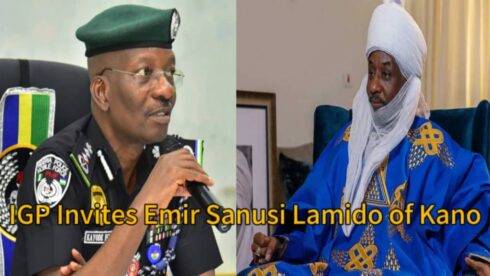Kayode Egbetokun, Nigeria’s Inspector General of Police, has taken decisive action by summoning the 16th Emir of Kano, Muhammadu Sanusi II, for questioning over a violent clash that marred the recent Eid-el-Fitr celebrations in Kano State. The IGP’s directive follows widespread reports of disturbances involving supporters of rival royal factions during the annual festivities, raising fears of a resurgence in the city’s volatile traditional power dynamics.
Security sources revealed that the investigation will focus on intelligence indicating that certain groups loyal to Sanusi II may have instigated confrontations in defiance of security advisories. The IGP emphasized the need for accountability, stating that “no individual, regardless of status or title, is above the law when public safety is at stake.” The summons marks a bold move that could reshape the already delicate relationship between Nigeria’s political elite and traditional institutions.
Emir Sanusi II’s Return Sparks Royal Rift in Ancient Kano Emirate
Kayode Egbetokun’s summons comes on the heels of a controversial return to public prominence by Emir Sanusi II, whose dethronement in 2020 remains a sore point in Northern political discourse. His participation in the Eid celebrations was seen by many as a power statement, reigniting old tensions between him and supporters of his successor, Aminu Ado Bayero.
Observers noted that Sanusi’s presence at the prayer ground appeared orchestrated to project legitimacy and reclaim his symbolic authority, a move that reportedly angered some traditional power brokers. Analysts warn that this perceived “dual emirship” risks destabilizing the region, especially when coupled with the historical weight the Kano Emirate carries in the socio-political matrix of Northern Nigeria.
Kayode Egbetokun: Police Maintain Neutrality as Political Undercurrents Intensify
Kayode Egbetokun reassured the public that the police force remains apolitical and committed to maintaining peace amid escalating royal rivalries. He urged all parties involved to avoid inflammatory rhetoric and allow law enforcement to conduct a thorough, impartial investigation into the cause of the violence.
Despite these assurances, political analysts believe the Kano Sallah incident is emblematic of deeper power struggles between Northern political dynasties, religious authorities, and the federal government. Critics argue that the timing of the summons could be interpreted as an indirect warning to influential figures seeking to mobilize ethnic or traditional loyalties against central authority.
Eyewitnesses Detail Chaos as Sallah Prayers Turn Violent
Kayode Egbetokun confirmed that multiple eyewitness accounts have been collected, describing how what began as a peaceful prayer session spiraled into mayhem. According to onlookers, clashes erupted after rival groups began chanting provocative slogans, prompting panic among worshippers and a swift deployment of security personnel.
The melee resulted in several injuries, damaged property, and the abrupt end of the celebration. Local residents voiced frustration over the government’s inability to preempt the conflict, especially given the heightened security warnings issued in the days leading up to the Eid holiday. “We saw it coming, and yet no one acted fast enough,” said a community leader who was present at the scene.
Traditional Institutions Under Fire as Public Trust Erodes
Kayode Egbetokun’s intervention has reignited debate over the evolving role of traditional rulers in modern Nigeria. While some view emirs as symbols of cultural identity and unity, others see them as political actors whose influence often undermines democratic governance. The ongoing drama in Kano exemplifies the blurred lines between heritage and hegemony.
Civil society groups have called for a clear legal framework to define the responsibilities and boundaries of traditional leaders, particularly in conflict-prone regions. “This isn’t just about one emir,” said human rights advocate Zainab Musa. “It’s about preventing the manipulation of tradition for political gain.” As investigations deepen, the future of traditional leadership in Nigeria remains under scrutiny.
Public Reaction Split as Northern Elites Close Ranks
Kayode Egbetokun’s bold move to summon a revered traditional ruler has triggered mixed reactions across the country. While some Nigerians hail it as a step toward equal justice, others accuse the police of overstepping their bounds in a matter steeped in cultural and historical complexity. The silence from many Northern elites has only fueled speculation of backdoor negotiations.
In Kano, public sentiment is divided. While Sanusi’s supporters view the probe as political persecution, his detractors see it as overdue reckoning. Meanwhile, calls for peace continue to echo as the region braces for the outcome of the IGP’s inquiry. Whether this becomes a defining moment for law enforcement or a dangerous misstep in an already fragile environment remains to be seen.
Table of Contents
Discover more from OGM News NG
Subscribe to get the latest posts sent to your email.














